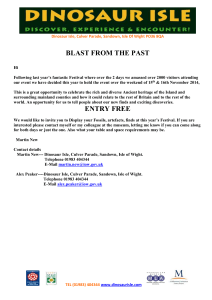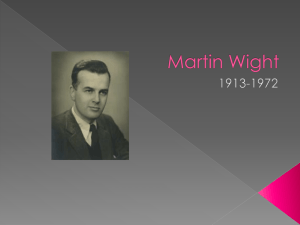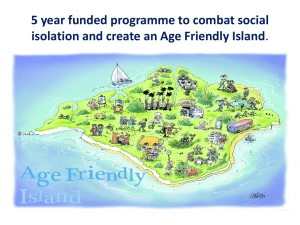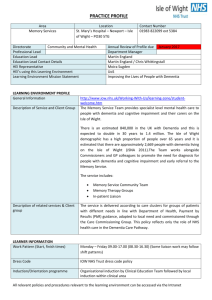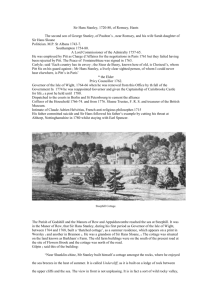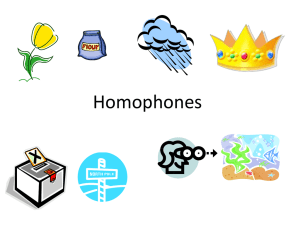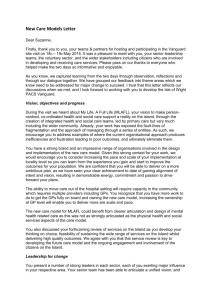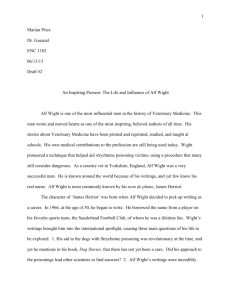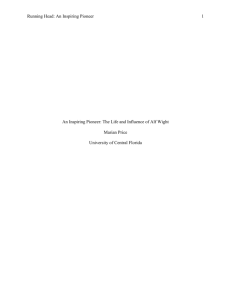An Emerging History of Christianity on the Isle of Wight Who was the
advertisement
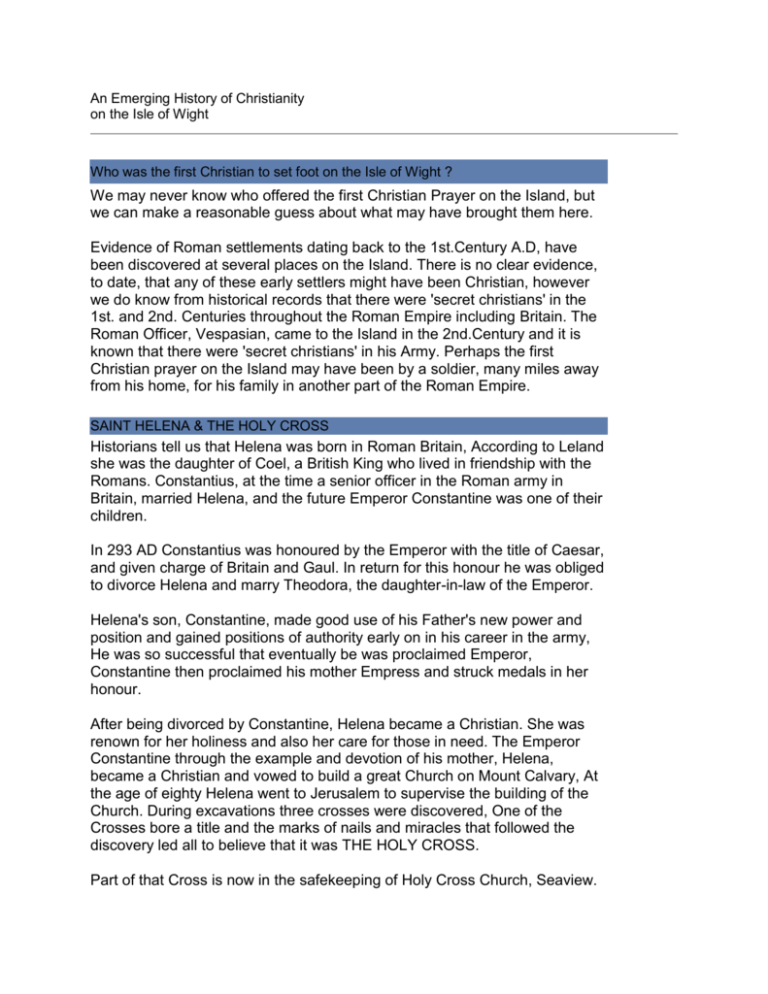
An Emerging History of Christianity
on the Isle of Wight
Who was the first Christian to set foot on the Isle of Wight ?
We may never know who offered the first Christian Prayer on the Island, but
we can make a reasonable guess about what may have brought them here.
Evidence of Roman settlements dating back to the 1st.Century A.D, have
been discovered at several places on the Island. There is no clear evidence,
to date, that any of these early settlers might have been Christian, however
we do know from historical records that there were 'secret christians' in the
1st. and 2nd. Centuries throughout the Roman Empire including Britain. The
Roman Officer, Vespasian, came to the Island in the 2nd.Century and it is
known that there were 'secret christians' in his Army. Perhaps the first
Christian prayer on the Island may have been by a soldier, many miles away
from his home, for his family in another part of the Roman Empire.
SAINT HELENA & THE HOLY CROSS
Historians tell us that Helena was born in Roman Britain, According to Leland
she was the daughter of Coel, a British King who lived in friendship with the
Romans. Constantius, at the time a senior officer in the Roman army in
Britain, married Helena, and the future Emperor Constantine was one of their
children.
In 293 AD Constantius was honoured by the Emperor with the title of Caesar,
and given charge of Britain and Gaul. In return for this honour he was obliged
to divorce Helena and marry Theodora, the daughter-in-law of the Emperor.
Helena's son, Constantine, made good use of his Father's new power and
position and gained positions of authority early on in his career in the army,
He was so successful that eventually be was proclaimed Emperor,
Constantine then proclaimed his mother Empress and struck medals in her
honour.
After being divorced by Constantine, Helena became a Christian. She was
renown for her holiness and also her care for those in need. The Emperor
Constantine through the example and devotion of his mother, Helena,
became a Christian and vowed to build a great Church on Mount Calvary, At
the age of eighty Helena went to Jerusalem to supervise the building of the
Church. During excavations three crosses were discovered, One of the
Crosses bore a title and the marks of nails and miracles that followed the
discovery led all to believe that it was THE HOLY CROSS.
Part of that Cross is now in the safekeeping of Holy Cross Church, Seaview.
The Small Particle of wood in a silver locket is on view once a year at the
church on Good Friday. This religious artefact may well be the oldest
Christian relic on the Isle of Wight. By special arrangement it is from time to
time made available to Churches of all denominations for very special events
or services.
Eoppa, the priest
First to bring Christianity to the inhabitants of the Isle of Wight?
AD 661 - In this year.........Wulfhere, son of Penda, ravaged in the Isle of Wight, and
gave the people of Wight to Aethelwald, king of Sussex, because Wulfhere had
stood sponsor for him at baptism. Eoppa, the priest, at the command of Wilfred and
king Wulfhere, was the first to bring Christianity to the inhabitants of the Isle of
Wight".
('Everyman' translation of the Anglo-Saxon Chronicle)
St. WILFRED
Apostle of the Isle of Wight
St. Wilfred was born in Northumbria around 634 A.D. At that time there was
no national King or leader; each area was ruled by a local chieftain who had
complete control of the lives of his subjects. St. Wilfred was very keen that
the new churches should be strongly united with the Universal Church so that
they would not be totally dominated by each local Lord.
Whilst returning from a journey to Rome Wilfred became very seriously ill, but
he suddenly made a complete recovery following a vision of St. Michael the
Archangel. St. Wilfred then went to Sussex where in 687 he converted the
local chief, Cedwalla, and then with the chief's support came to the Isle of
Wight.
St. Wilfred is said to have landed not far from Brading (possibly somewhere
in the area now known as Bembridge). He Baptised many at Brading and
built the first Christian Church there.
The first Catholic Church 'on the hill' at Bembridge is thought to have been
named in honour of the Archangel who appeared to St. Wilfred and
encouraged him in the Missionary work which brought him to this Island.
The Wesleys Detained at Cowes
An extract taken from Chapter 11 of 'Methodism in the Isle of Wight' by John
B. Dyson and published by George M. Burt of Ventnor in 1865!
The length of time, now more than one hundred and ten years, since
Wesleyan Methodism secured a foundation in the Isle of Wight, makes it
probable that we shall never know the exact circumstances under which the
first stone was laid of spiritual edification which by the grace of God has been
reared. Nearly twenty years before that event, John and Charles Wesley had
been on the Island and Charles had preached several times at Cowes. They
were detained by stormy weather as they were on their way to America.
Under date - November 1st 1735 John Wesley says, “we came to St Helen’s
harbour and the next day into Cowes Road. The wind was fair but we waited
for the ‘Man of War’ which was to sail with us. This was a happy opportunity
of instructing our fellow travellers. My He who’s seed we sow give it the
increase”.
Thursday 20th - We fell down into Yarmouth Road but the next day we were
forced back into. During our stay here there were several storms in one of
which two ships in Yarmouth Road were lost.
Sunday 23rd - At night I was awoke by the tossing of the ship and roaring of
the wind and plainly showed I was unfit for I was unwilling to die.
Tuesday Dec. 2nd - I had much manifestation in conversing with one that
was very ill and very serious. But few days she recovered from her sickness
and her seriousness together.
Wednesday 10th - We sailed from Cowes and in the afternoon passed the
Needles. Here the ragged rocks with the waves dashing and foaming at the
feet of the and the white side of the Island rising to such a height
perpendicular from the beach, gave a strong idea of (Him that spaneth the
Heavens, and holdeth the waters in the hollow of His hand).
From the journal of Mr Benjamin Ingham, who was one of the Oxford
Methodists and a fellow voyager of the Wesley’s, we are able to cull some
additional facts. He says “Having now no further doubt but that I was
intended by providence to accompany Mr Wesley on Tuesday 14th
October1735, he, his brother Charles, myself and Mr Delamotte (son of a
merchant in London who had a mind to leave the world and give himself up
entirely to God) being accompanied by Mr Morgan, Mr Burton (one of the
trustees) and Mrs James Hutton, took boat at Westminster for Gravesend
and went on board the ‘Symmonds’. We have two cabins on the fore castle, I
and Mr Delamotte having the first and Messrs. Wesley the others. Theirs was
made pretty large so that we could all meet and pray in it.
17th - Mr Wesley began to learn the German language in order to converse
with the Moravians, a good, devote, peaceable and heavenly-minded people
who were persecuted by the Pacifists and driven from their native country
upon account of their religion. They were received by Count Zinalndorf of
Huerhut who sent them into Georgia.
19th - Mr John Wesley began to preach without notes expounding a portion
of Scripture extempore according to the ancient usage.
Sunday November 2nd - We passed the fleet at Spithead and came into
Cowes Road off the Isle of Wight where we lay until 10th December. During
our stay here we had an excellent opportunity of promoting the work of God
among our fellow passengers. Mr Charles Wesley, being known to the
minister of Cowes, preached several times in the Island and read at a poor
woman’s house to a good number of people and I believe they were not a
little edified by his addmonitions and excitations.
3rd. - We took a walk into the Island where we agreed upon the following
resolution, in the name of God Amen! - We whose names are underwritten,
being fully convinced that it is impossible either to promote the word of God
among the heathen without an entire union among ourselves or that such a
union should subsit, unless each one will give up his single judgement to that
of the majority, do agree by the help of God first that none of us will
undertake anything of importance without first passing it to the other three.
Secondly that wherever our judgements differ any one shall give up his single
judgement or inclination to the others. Thirdly that in the case of an equality,
after begging God’s direction, the matter shall be decided by lot. JW, CW, DI
and CD.
Mr Ingham enumerates several things which he regarded as providential for
their detention at Cowes. These reasons were - the departure of a gentleman
from the ship who scoffed at religion and was a snare to him. The removal of
the second mate who “was a very insolent and ill mannered fellow who had
abused many of the passengers and also Mr Wesley and at least affronted
Mr Oglethorpe to his face, and the reception of a young man on board who
gave the following account of himself - he had left his parents, he said, who
were rich (though he was their only son) because they would not let him
serve God as he had a mind. He used to spend a good part of the night in
prayer not having opportunity to do it my day. When he left home he did not
know where he should go having no clothes with him but he did not seek for
money or worldly enjoyment, he desired only to save his soul. When he was
travelling he had prayed that he might go to some place where he could have
the advantage of public prayers and the Holy Sacraments. Several times he
had thoughts of turning ‘Hermit’ but providence had brought him to us and he
was glad to meet with ministers with whom he could freely converse about
spiritual things. This I think", said Mr Ingham, was another reason for our
delay”. All love, all glory be to thee Oh Lord.
10th - Now at length it pleased our Heavenly Father to send us a fair wind.
We left Cowes about 9 in the morning. We made the best of our way running
between 7 and 8 miles an hour.
Revd. John Wesley Etheridge 1804 -1866
(supplied by Anne Vinnicombe)
He was born at Youngwoods on 24th February, 1804, the third of seven
children. Youngwoods is four miles from Newport on the Isle of Wight. His
father was John Etheridge and his mother Alley Gray. His parents were
devoted methodists and, from the first introduction of Methodism to the
island, their house was ever open to its ministers.
While he was yet an infant, his father, having set out from home one Sunday
morning to fulfil an appointment in a distant part of the circuit, was impressed
with the thought that he ought to turn back. He did not wish, however, to
disappoint his congregation and tried therefore to resist the impression; but it
seemed to him as if a voice said, Go back; go back. He therefore went back,
and, on inquiring for the child, found that he had fallen into such danger that
had he not been rescued immediately he must have died.
His sister's testimony is, that he was a "child of a gracious disposition,
remarkable for tenderness of conscience and for filial piety".
John Wesley Etheridge was placed at school for a time under the care of a
Baptist minister at Portsea, under whose tuition he remained until his father
opened an academy there, which was subsequently removed to Newport. Mr.
Etheridge was will qualified for the work of teaching, and to train the mind of
his own son would be to him a great joy.
But young Etheridge was a student after he left school and indeed to the very
close of his life. He had an aptitude for languages and became familiar with
Greek, Latin, French, German, Hebrew and Syriac. He never went to college
or even to a high-class school. To a great extent he was self taught.
In 1824 he was placed on the plan as a local preacher. Around 1827 he was
sent to Hull to assist the Rev. Dr. Beaumont who was in poor health. He
remained there until the Conference of 1828, when he was appointed to the
Bingley Circuit. The remaining years of his probation were spent at Bingley,
Lambeth, and Brighton. At the Conference of 1831, held in Bristol, he was
received into full connexion, and solemnly ordained to the office and work of
the Christian ministry. Soon after he was united in marriage to Miss.
Middleton. He remained in Brighton two years longer.
